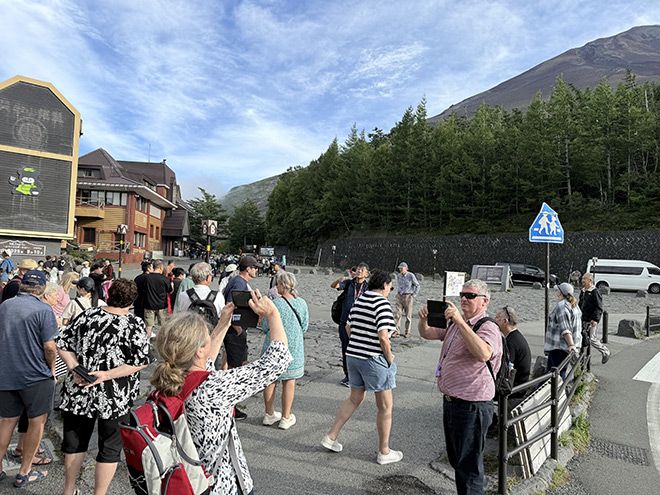As Mount Fuji officially closed its summer climbing season on Sept. 10, authorities declared a landmark success in curbing “bullet climbing,” the dangerous practice of ascending the mountain overnight without rest or accommodations.
This was the second season since Yamanashi Prefecture introduced climbing regulations on the Yoshida trail, the most popular route to the 3,776-meter summit.
“I’m relieved that we were able to close the mountain without any major trouble,” said prefectural official Toru Saegusa.
Building on last year’s initial restrictions, this season saw even tighter measures. These included higher access fees, earlier gate closures and stricter enforcement on proper equipment.
Among this year’s key updates was raising the mandatory climbing fee from 2,000 yen ($13) to 4,000 yen and moving up the daily gate closure two hours earlier, with entry now barred between 2 p.m. and 3 a.m.
Additionally, prefectural officials were granted broader authority to deny entry to inadequately equipped climbers, such as those in sandals, short pants, tank tops or without proper rain gear.
According to officials, more than 1,100 individuals received warnings or guidance this season, with 90 percent of them being foreign tourists. Rain gear violations made up nearly 90 percent of these cases.
A local gear rental shop near the fifth station reported that up to 90 people per day rented proper climbing equipment, many after being stopped and advised by officials.
On the same day, three climbing routes on the Shizuoka Prefecture side of the mountain also closed for the season. Those routes implemented access fees for the first time this year, following Yamanashi’s lead.
Authorities and local stakeholders celebrated the clear impact of the restrictions.
“Overnight climbers are now virtually zero. It’s a groundbreaking achievement,” said Masatoshi Hada, head of Mount Fuji operations in Fujiyoshida city.
Yoshikage Inoue, who runs a mountain hut at the eighth station and holds a leadership role in a local lodge organization, echoed the sentiment.
“Last year, we had exhausted climbers collapsing in front of our huts after racing to beat the gate closure. But this year, we had none,” he said.
He added that the issue of bullet climbing has been eliminated.
DIP IN JAPANESE CLIMBERS
The number of climbers increased to 142,000 this season, up 10,000 from last year. Despite this, some worry that the new fees are deterring domestic visitors, particularly families.
Because the 4,000 yen fee applies to children as well, a family of five would pay 20,000 yen just to access the trail.
“It’s sad to see Japanese distancing themselves from a mountain that has been part of our cultural heritage for generations,” Inoue said.
Fujiyoshida Mayor Shigeru Horiuchi acknowledged this concern during a news conference on Sept. 10.
“The decline in families is disappointing. I will propose discounted rates for children to the prefecture,” he said.


AloJapan.com